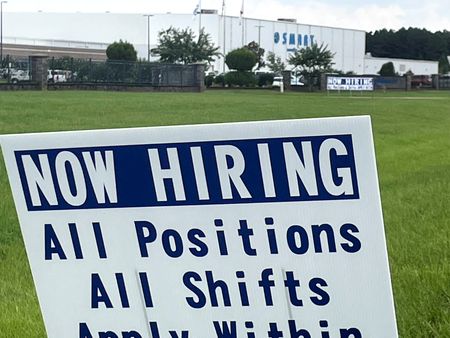By Lucia Mutikani
WASHINGTON (Reuters) – U.S. private payrolls increased more than expected in October, offering more evidence of labor market resilience, but there are signs that the Federal Reserve’s aggressive monetary policy tightening is weighing on interest rate-sensitive industries.
The pick-up in private hiring shown in the ADP National Employment report on Wednesday was concentrated in the services sector, specifically the leisure and hospitality industry. Hiring in the goods-producing sector slumped, with factories shedding jobs. The report followed on the heels of news on Tuesday of an unexpected jump in job openings in September.
The Fed on Wednesday delivered a fourth three-quarters of a percentage point interest rate hike, but signaled future increases in borrowing costs could be made in smaller steps to account for the “cumulative tightening of monetary policy” it has enacted so far.
The U.S. central bank has raised its policy rate from near zero in March to the current range of 3.75% to 4.0%, the fastest pace of policy tightening in a generation or more.
“We expect job growth to remain positive for now,” said Rubeela Farooqi, chief U.S. economist at High Frequency Economics in White Plains, New York. “But the pace is expected to slow in response to Fed rates hikes.”
Private employment increased by 239,000 jobs last month. Data for September was revised down to show 192,000 jobs created instead of 208,000 as previously reported. Economists polled by Reuters had forecast an increase of 195,000 private jobs.
The services sector added 247,000 jobs, with the leisure and hospitality industry accounting for 210,000 positions. Payrolls in the trade, transportation and utilities industry increased by 84,000 jobs.
But employment decreased in information, financial activities, professional business services as well as education and healthcare industries.
The goods providing sector shed 8,000 jobs as manufacturing lost 20,000 positions. But natural resources and mining added 11,000 jobs while construction payrolls rose by 1,000 positions.
“While we’re seeing early signs of Fed-driven demand destruction, it’s affecting only certain sectors of the labor market,” said Nela Richardson, ADP chief economist.
The report also showed wages for job stayers increased 7.7% in October, in line with recent months. Wage increases for job changers dipped 15.2% from 15.7% in September.
Stocks in Wall Street rallied on the Fed being open to smaller rate increases in the future. The dollar fell against a basket of currencies. U.S. Treasury prices rose.
“The committee understands monetary policy impacts the economy on a lag, and the members are willing to slow the pace of hikes as higher rates feed into the financial system,” said Brent Ciliano, chief investment officer at First Citizens Bank Wealth Management in Raleigh, North Carolina. “That said, we still expect markets to remain volatile as investors navigate slowing global growth, inflation, and higher interest rates.”
SOLID JOB GROWTH
The ADP report, jointly developed with the Stanford Digital Economy Lab, was published ahead of the Labor Department’s Bureau of Labor Statistics’ more comprehensive and closely watched employment report for October on Friday. Following recent changes, the jury is still out on whether it offers a reliable signal on the BLS data.
“The figures from recent months have not given us the sense that the ADP report will prove to be a reliable signal about the BLS data in real time,” said Daniel Silver, an economist at JPMorgan in New York. “Keeping all of that in mind, the October ADP report looks fairly consistent with expectations for Friday’s BLS report, with its headline pointing to October being another strong month for job growth.”
According to a Reuters survey of economists, private payrolls likely rose by 200,000 jobs last month after rising by 288,000 in September.
With no job gains expected in the government sector, overall nonfarm payrolls are also forecast to have increased by 200,000. The economy created 263,000 jobs in September.
Though the Fed’s stiff rate hikes are cooling demand, employers continue to seek workers. There were 10.7 million job openings at the end of September, with roughly 1.9 openings for every unemployed person.
(Reporting by Lucia Mutikani; Editing by Chizu Nomiyama and Andrea Ricci)
